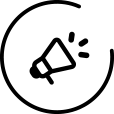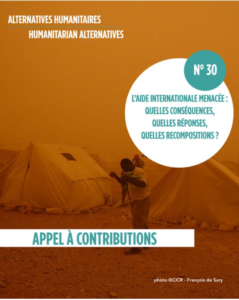N°30 – November 2025 : « International aid under threat: What consequences? What responses? What reconfigurations? »
The Focus of this issue is coordinated by François Audet ‑ Director of the humanitarian research centre OCCAH (Observatoire canadien sur les crises et l’action humanitaires) and a member of the scientific council of Humanitarian Alternatives ‑, by Jean-François Corty ‑ a doctor, President of Médecins du Monde-France and Associate Researcher at the think tanks IRIS (Institute for International and Strategic Affairs) and Institut Convergences Migrations ‑ and by Stéphanie Tchiombiano ‑ Associate Lecturer at the political science department of Paris Panthéon-Sorbonne University and a member of the scientific council of Humanitarian Alternatives ‑, as well as Boris Martin as the review’s Editor-in-Chief.
Everyone now recognises that Donald Trump’s second term as US president marks a radical transformation of the global arena. His controversial initiatives and dramatic announcements are reshaping the balance of geopolitics. International solidarity and humanitarian action are especially affected by this. The freezing of American aid (including PEPFAR – the President’s Emergency Plan for AIDS Relief) and the dismantling of the US governmental aid agency USAID have caused 92% of projects supported by the latter to be brought to a sudden halt. This decision, which is so brutal that it already jeopardises thousands of lives and will continue to do so in coming months, is part of a systemic reappraisal of public aid for development on a global scale. This crisis in international aid is taking place against an already sensitive and legitimate backdrop of ethical questioning about a certain paternalistic or neo-colonial dimension to aid which, in the end and in spite of itself, may be helping to reinforce the inequalities it is supposed to combat. We can speculate that this situation is not insignificant, and that it opens the way to contrasting reactions on different continents.
The consequences of these aid cuts from the world’s biggest funder are all the more catastrophic for international aid organisations of every kind that they add to drastic cuts already introduced in Canada and several European countries in recent years. Indeed, Europe, when it has not outpaced, is following this trend in aid withdrawal. For example, in 2024 France announced it would be reducing its aid budget by 35% for 2025. And different European states, from the UK and Switzerland to the Netherlands and Belgium, have pursued a similar path of reduced budgets, often to support their rearmament. The European Union itself could follow these national initiatives.
Yet the impact is not limited to reduced funding: this reduction is part of an ideological targeting of certain sectors, which include humanitarian aid, of course, but also gender equality, sexual identities, human rights, and ecology and environmental affairs. Beyond these fields, public health, multilateralism, science and democracy are the focus of targeted attacks.
The trend also involves a deliberate reappraisal of norms, principles and international humanitarian law (IHL). However contested or misrepresented it has been, IHL has, up to now and ever since it emerged, offered a framework for protecting humanitarian organisations and for limiting the influence of certain players and authoritarian regimes. The current trend is creating a vacuum that criminal groups, extremist movements and political powers are already exploiting or that populism will fill, turning aid into an opportunistic and discriminatory form of soft power tinged with cronyism and even malevolence. Against a backdrop of growing tensions, in which migratory crises, armed conflicts and climate change are intensifying, the weakening of aid can only usher in a worse situation for the most fragile countries. Such a worsened situation is all the more likely that the trend goes hand in hand with positions that are resolutely hostile to authorities with universal jurisdiction. For example, the US has threatened the International Criminal Court (ICC) and Viktor Orbán has announced he will withdraw Hungary from the Rome Statute of the ICC.
For non-governmental organisations (NGOs), this trend is a complete upheaval of the aid architecture on which they have relied for decades. A butterfly effect is now being felt: sudden decisions made in Washington DC and elsewhere are having consequences throughout the world, pushing aid organisations to a cliff edge and already prompting them to lay off staff and shut down programmes. Indeed, the brutal freezing of US funding is not only affecting American aid or organisations, but is weakening most organisations worldwide, including French NGOs – especially those working in crisis zones.
There is also a profound impact on United Nations (UN) humanitarian agencies, from the World Food Programme and the World Health Organization to the UN Refugee Agency and UNICEF (UN International Children’s Emergency Fund), not to mention certain fragile states that have depended on US funds to maintain not only their humanitarian programmes, but also their social or health programmes.
Local organisations in struggling countries are also adversely affected by the unprecedented extent of the crisis. And as a double blow, this crisis is undermining localisation in humanitarian aid – a trend that was already sluggish – in its purpose of transferring more funding and organisational freedom to NGOs of the Global South. This vacuum is an opportunity for other channels of funding, which should be observed and documented.
Ultimately, the most vulnerable populations are the ones who will pay the price of these brutal decisions. We can expect unprecedented human tragedies: some populations will see their living conditions and health conditions deteriorate dramatically from a lack of aid, healthcare and protection mechanisms, which were already notoriously inadequate in proportion to the scale of the crises underway.
This special issue of Humanitarian Alternatives will help us better understand the implications of this unparallelled crisis. Above all, it will help us document the ways in which aid players, especially partners in the Global South, are adapting to the crisis and finding solutions. This call for papers, brought out well in advance of publication of this issue, should, of course, be revised and expanded by the writers concerned as the international situation evolves so that the review can reflect the challenges as accurately as possible just a few weeks before it is published.
Remaining open to proposals that our potential contributors send us and without being exclusive, we would like to give priority to articles:
- that focus on concrete, measurable, observed consequences of the decisions made – in the freezing and reduction of public aid for development and humanitarian work – for the budgetary balance, structure and managerial organisation of local and international NGOs and for the populations they have helped up to now, in an economy that is already fragile and underfunded;
- that document the innovations and adaptation strategies that both local and global humanitarian organisations have applied to cope with the widespread reduction of funding and the reappraisal of international aid’s fundamental principles: concrete responses, alternative funding models, innovative resilience mechanisms, organisational adaptations, etc.;
- that help rethink the architecture of international cooperation in a context of withdrawal of big traditional funders, rearmament and potential new conflicts in order to better protect vulnerable populations in the face of multiple crises that are persisting or even worsening (climate crisis, migration crisis, conflicts already underway, etc.);
- that reveal analyses from researchers, in both Global South and Global North countries, of the attacks against the world of research and, more specifically, against researchers who analyse practices in international solidarity.
Submit a proposal for an article
If you are a humanitarian practitioner or researcher, and would like to submit an article proposal on this particular theme, please send a summary of your subject and a draft plan (2 pages maximum, including a short biography) before 2 June 2025 to the following email address: contact@alternatives-humanitaires.org . You will receive a reply in the next 15 days.
The finished articles, written in English or French, should be submitted by 15 september 2025 and should be around 2,200 words (in English) or 2,400 words (in French), both including footnotes. Seven or eight articles will be published for the Focus section of this issue of Humanitarian Alternatives.
For each issue, we also consider articles relating to humanitarian work that explore subjects other than that which this issue focuses on. They could be published in the sections Perspectives, Transitions, Innovations, Ethics, Reportage or Tribune sections. So we are inviting you to put forward articles for these sections too.
Objet :
Alternatives humanitaires
Caractéristiques :
• Characters : 15 000 signes (esp. compris)
• Abstract submission : 2 June 2025
• Article submission: 15 September 2025
Contact :


